Why have one day when you can have 12? Well, in Korea they don’t just celebrate Valentine’s Day on 14 February – in fact, the 14th day of every month holds a special kind of romantic significance. With days for singletons, days for forgiveness and days just to hug, there’s something to celebrate no matter what your relationship status.
Each year competitors the world over gather in the village of Sonkarjävi, Finland, to partake in this bizarre sporting event. With wife or partner (marriage isn’t a necessity) slung over the shoulder, participants get stuck into a variety of challenges and the winner receives the partner’s weight in beer as well as significant kudos.
The Tomb of the Unknown Soldier is Moscow’s top destination for wedding parties, who snap photos and drink champagne while the bride and groom pay their respects by laying flowers at the grave site.
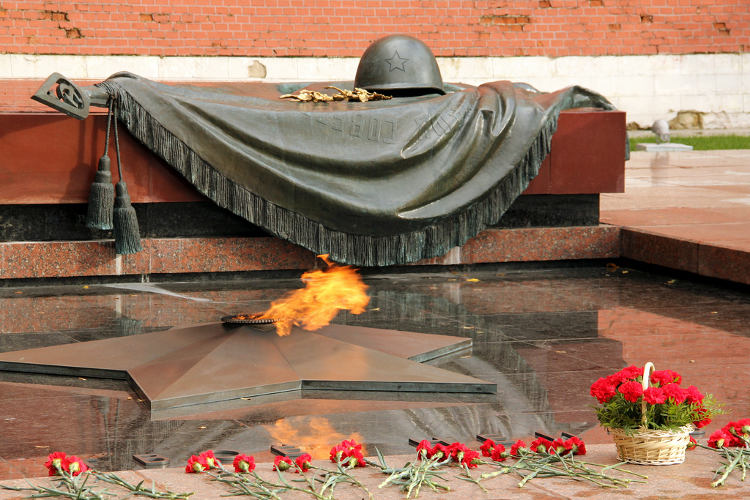
Tomb of the Unknown Soldier, Moscow. Image by Ana Paula Hirama / CC BY-SA 2.0
Think you’ve got it hard, traipsing around the shops for that perfect wedding gift? How about this – in Fiji it’s common practice when asking for a woman’s hand in marriage that the man presents his soon-to-be father-in-law with a tabua (whale’s tooth). Because, let’s face it, it’s not real love unless you have to dive hundreds of metres beneath the ocean and go toe to fin with the world’s largest mammal.
An old Kyrgyz adage foretells that tears on the wedding day bode for a happy marriage – perhaps this explains why some parents of kidnapped girls consent to the forced marriage (despite the practice being illegal since 1991). If the girl is to escape, and some do, it takes a lot of determination and courage to withstand the pressure brought to bear.
This weird and wonderful exhibition in Zagreb, Croatia, features a quirky collection of amorous mementos and random paraphernalia (donated by people from across the globe) left behind after a break-up.

Museum of Broken Relationships, Zagreb. Image by Connie Ma / CC BY-SA 2.0
In this (somewhat gross) pre-wedding tradition, the bride-to-be, and sometimes even her groom, are pelted with all manner of disgusting things from rotten eggs to treacle and fish and are paraded through the streets. The Scots believe this humiliation serves to better prepare a couple for married life. It certainly brings a whole new meaning to the term ‘blushing bride’!
Inspired by Federico Moccia’s book and film I Want You, many people began attaching their own love padlocks to the Ponte Milvio in Rome. In what is now a worldwide phenomenon, couples attach the locks – often complete with a Sharpied proclamation of love – and throw the key into the river as a symbol of their unbreakable love and commitment to one another. However, these amorous trinkets have caused quite a controversy of late, particularly in Paris where, besides being a (somewhat poetic) eyesore, they are becoming an environmental hazard and have to be removed.

Love padlocks on Pont de l’Archevêché, Paris. Image by JD / CC BY 2.0
One Bornean tribe, which boasts some of the most heart-meltingly sweet wedding traditions, also has one of the most gut-churningly gross customs. After their special day, newlyweds are not allowed to leave their own house, not even to use the bathroom. The bizarre custom of constant supervision and a restricted diet is said to bring the couple good luck in their marriage.
As if the wedding day wasn’t stressful enough, when the Chinese groom comes to fetch his bride he’s confronted by a barrage of bridesmaids blocking his entrance. After demanding red envelopes of money, the bridesmaids (and sometimes even the groomsmen) subject the groom to a series of games and physical tasks – he is forced to sing and generally teased to prove his love.
Set against the mystery and romance of the Atlas Mountains, legend tells the story of two star-crossed lovers forbidden to see each other. In a Romeo-and-Juliet-esque twist of fate, the heartbroken couple drowned in their own tears, forcing their families to reconcile and establish what’s now known as Morocco's Imilchil Marriage Festival. Each year feasting, flirting and frivolity is the backdrop for local tribespeople to socialise and potentially meet their future partner.
Step back in time into the greatest love story ever. Each year thousands flock to Verona's Casa di Giulietta, a 14th-century house believed to have belonged to the Capulets (never mind that they were all fictional characters), to add their amorous graffiti and notes of adoration to the courtyard walls where once fair Juliet was wooed by her Romeo.
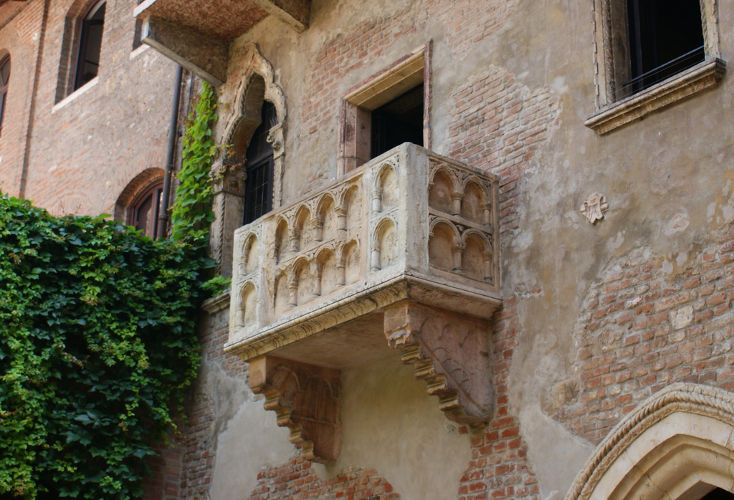
Juliet’s Balcony, Verona. Image by Spencer Wright / CC BY 2.0
Think you had cool parents growing up? Think again. In a revolutionary parenting style, some African tribes provide their daughters with ‘courting huts’ to entertain potential suitors away from the parents’ gaze. A similar custom exists in Cambodia, where unmarried teens are even encouraged to use these huts to explore multiple partners, both socially and sexually, all in a quest to find that one true love.
We’ve all heard of cutting the cake, but cutting the chicken? The Daur people of China have a tradition for couples who become engaged to dissect a chicken and inspect its liver. If the liver is a healthy shape, this is seen as a good omen and a date can be set. If not, the couple must keep searching for that prophetic liver.
It’s definitely acceptable to get a little teary at the wedding, but a month before might be overkill. However, for China’s Tujia people it’s customary for the bride-to-be to begin weeping for an hour a day one month before the wedding. Sometime after, her mother joins in, and so on until all the women of the family are shedding a habitual tear. Despite the tears, this is a joyous celebration and it’s said that the different sounds of the women crying are almost like a song.
In an annual courtship event, the men of the Wodaabe Fula in Niger dress up in elaborate costumes, put on make-up and dance and sing in a bid to win a bride. What makes this custom unique is that at the end of the performance it’s the women who get to do the choosing.
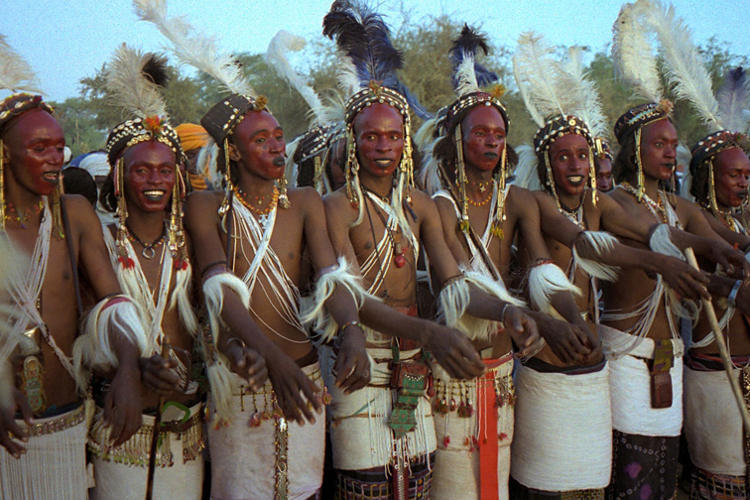
Gerewol Festival, Niger. Image by Dan Lundberg / CC BY-SA 2.0
On 8 March Russians celebrate Women’s Day. In a custom similar to Valentine’s Day, women are presented with gifts of flowers and chocolate, as well as the chance to put their feet up whilst the men take care of the daily chores.
This simple and sweet Puerto Rican tradition sees a bride doll draped in charms and placed at the head of the top table of the wedding reception. Towards the end of the celebrations, the charms are handed out to the guests as tokens of love and thanks.
On Valentine’s Day in Japan it’s the women who buy chocolates for the men. But never fear, ladies: one month later it’s White Day, when the chaps have to splash out for the girls if their feelings are mutual. Oh, and did we mention they are expected to spend twice as much?
This adorable Welsh tradition gives a whole new meaning to the term ‘spooning’. The beau presents his lover with a meticulously carved wooden spoon as a gesture that he will always feed and provide for her. If the affections are not mutual, the spoon is returned (awkward), but if the spooning is successful, the sweetheart must wear it around her neck for a number of days.
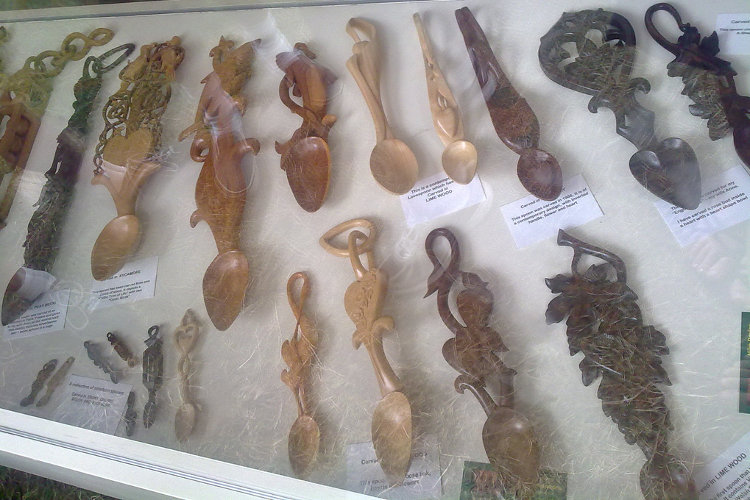
Welsh love spoons. Image by Paulo Ordoveza / CC BY 2.0
As the date harvest comes to an end in Ghadames, Libya, locals flock to the World Heritage–listed old quarter to relish in their fruitful harvest. As the festivities progress, expect to see many wedding ceremonies held as a coming-of-age celebration for young men.
A cherished Aussie tradition, B and S Balls offer a rare opportunity for youngsters from the bush to socialise – that would be the censored version. Notorious for binge drinking, dangerous stunts and casual sex, these parties are under pressure from insurance companies to close down. But beneath the dust and debauchery, the Balls are loaded with that quintessential Aussie joie de vivre and are seen as a rite of passage for kids in the Outback who often lead quite secluded lives.
Known for their ebullient spirit, Greek weddings are definitely on our radar. A particularly wonderful tradition is the couple’s first dance, when guests pin money to the bride’s and groom’s clothing leaving them twirling about the floor entwined in decorative (not to mention, expensive) paper streams. Believe it or not, this custom is actually considered an honour for the guests.
A key feature in Arabic and African communities is the Swahili women's custom to adorn themselves with intricate henna patterns before a wedding. They signify the bride’s beauty, womanhood and worth, so she, naturally, boasts the most elaborate designs – except for the mother of the bride, perhaps. Aside from their aesthetic delights, these tattoos represent an empowering, sensual quality in Swahili culture, as the design often conceals the groom’s initials in a secret spot on the bride’s body.
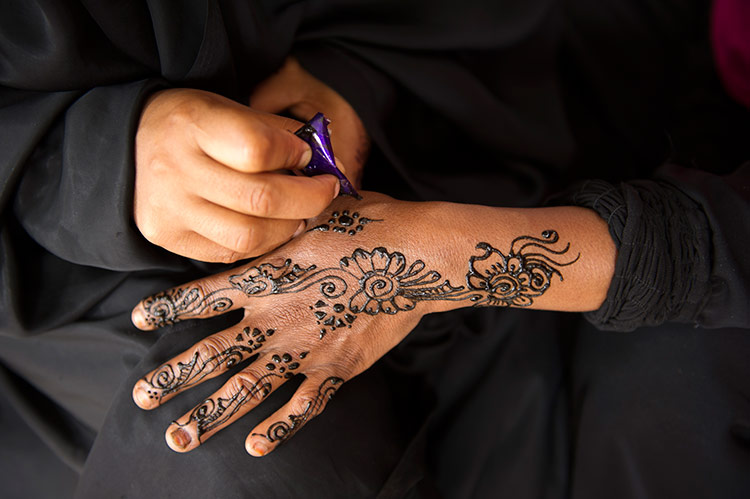
A Swahili woman painting hands with henna. Ariadne Van Zandbergen / Lonely Planet Images / Getty Images
Divorce is a fairly common occurrence these days – still, it should be the furthest thing from your mind on your wedding day, right? Apparently not in the Ukraine, where extremely traditional couples take revenge on their matchmaker in anticipation of a potential messy divorce in the future.
India is a country where marriage is revered, so advertising prospective suitors and singles in local papers and online is commonplace, but a new Hindi-language channel is taking it one step further. Shagun TV channel features a glitzy new show which is basically teleshopping for singles. If you’ve ever felt like your match.com profile just wasn’t doing you justice, could this be the thing for you?
You can forget trying to lose those last few pounds before your big day – in Mauritania, bigger is better. A larger wife signifies wealth that a man can provide in excess for his family. Unfortunately, this isn’t as jolly as it sounds: with many Mauritanian women being force-fed or suffering from long-term health issues caused by obesity, the custom has come under much public scrutiny which resulted in government taking action to protect young women and children.
Deep in the jungles of Papua New Guinea you’ll find this amazing display of colour, cacophony and courtship. The tribesmen paint their bodies and don colourful feathered costumes in an attempt to impress potential lovers. The sing-sings are a kind of spiritual mimesis – the tribesmen take on the form and mating rituals of the male birds-of-paradise in a kaleidoscopic show of affection.
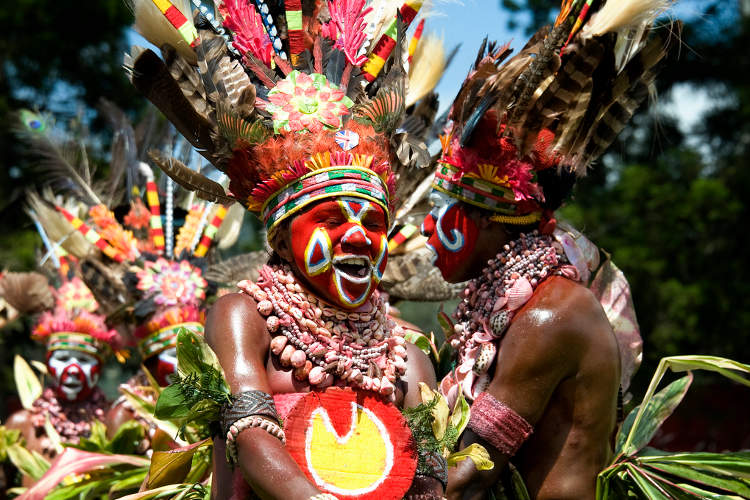
Mt Hagen sing-sings, Papua New Guinea. Image by Mark Robinson / CC BY 2.0
Some unlucky girls in India are born during the astrological period when Mars and Saturn are both under the seventh house. What’s so wrong with that, you ask? Basically, it means they are cursed. Those unfortunate few, known as Mangliks, are said to bring an early death to their husband. The only remedy, it would seem, is to have the Manglik marry a tree and then have the tree cut down to break the curse.
In a weird, wonderful, yet utterly gross fashion, French newlyweds were made to drink the leftovers from their wedding party out of a toilet bowl. Yuk! Thankfully, this custom no longer exists in its entirety, but don’t be surprised if you come across the bride and groom supping on chocolates and champagne served out of a replica toilet bowl. How romantic.
In Korea it’s commonplace for the groom to have his feet whipped with fish and canes the night before his wedding. Supposedly, this bizarre act of cruelty proves the groom’s strength and character.
When the Marriage Act of 1754 made it illegal for persons under 21 to get hitched, young English sweethearts came up with a cunning plan to simply hop across the border to Scotland where the law didn’t apply. As the first village en route, Gretna Green grew into the favourite spot for eloping couples – to this day, some 5000 couples visit each year to tie the knot or reaffirm their vows.

Gretna Green, Scotland. Image by milo bostock / CC BY 2.0
A custom from the American Deep South, ‘jumping the broom’ means the newlyweds leap hand-in-hand over a ceremonial broom, which symbolises the start of their journey into domesticity and a new life together. Born in the time of slavery, when the wedding vows and ceremonies of African Americans were not recognised, this humble tradition pays homage to a rich and important African American heritage.
In a celebration of the feast of St Sargis, the patron saint of young love, unmarried Armenian women eat a slice of salty bread in the hopes of having a prophetic dream about the man they’ll marry. Not to be taken too seriously, the idea is that the man who brings you water in your dream is your future beau. It’s also a kind of bonding ritual for the women in the family to share and interpret each other’s dreams.
Brought to light by the gaudy UK TV phenomenon My Big Fat Gypsy Wedding, this controversial custom sees young male travellers picking off members of the opposite sex and attempting to force a kiss out of them by somewhat violent means.